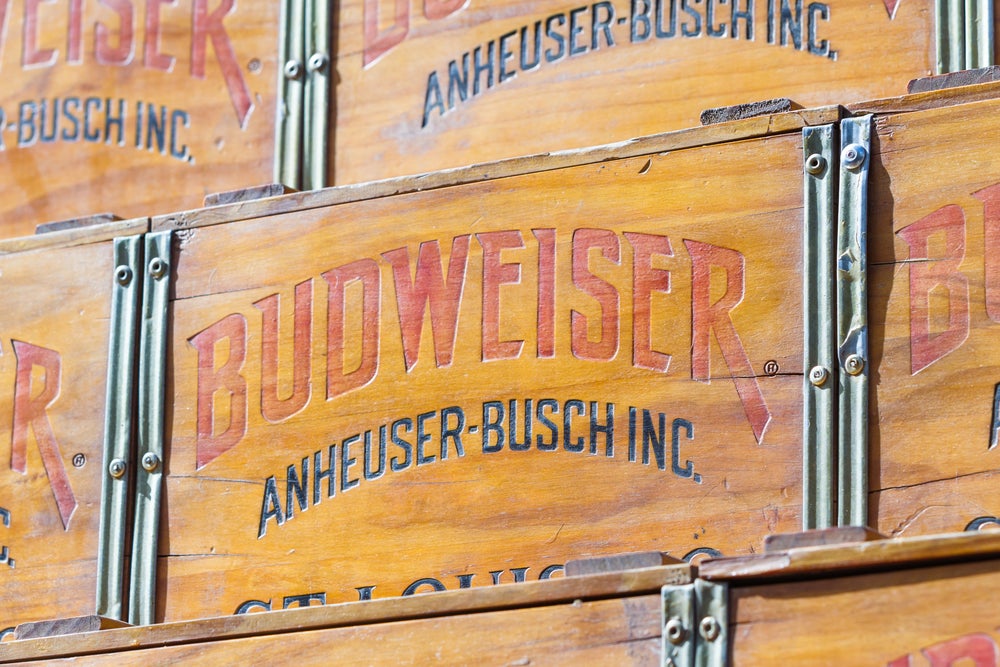AB InBev Beats Revenue Views, But Shares Down On Inflation Challenges Anheuser-Busch InBev (NYSE: BUD) gapped lower Thursday evan as second-quarter sales topped views. Investors were in no mood for celebration as the com...
By Kate Stalter
This story originally appeared on MarketBeat

The party is back on if you use Anheuser-Busch InBev (NYSE: BUD) second-quarter sales as your benchmark.
However, investors were in no mood for celebration, sending shares of the world's biggest brewer lower following Thursday's earnings report.
The stock gapped down at the open, as AB InBev reported frothy revenue that topped pre-pandemic territory. However, with costs on the rise (a familiar refrain these days), profit failed to meet Wall Street views.
In fact, AB InBev joins other food producers citing inflationary challenges tightening the grip on profitability. For example, Nestle (OTC: NSRGY) updated its guidance - and not in a good way. The Swiss food and beverage giant had earlier said it expected greater profitability this year, but now says higher costs will lower that bottom-line number.
AB InBev earned $0.95 per share on revenue of $13.50 billion, year-over-year gains of 107% and 32% respectively.
In its full-year outlook, the company said:
- EBITDA is expected to grow between 8-12%, while revenue growth stays ahead of that "from a healthy combination of volume and price. The outlook for FY21 reflects our current assessment of the scale and magnitude of the Covid-19 pandemic, which is subject to change as we continue to monitor ongoing developments."
- When it comes to cost of capital, AB InBev expects the average gross debt coupon in FY21 to be approximately 4.0%.
- The company sees pension interest expenses and accretion expenses being in the range of $140 to $160 million per quarter, dependent upon currency fluctuations.
- AB InBev expects an effective tax rate in the range of 28% to 30%. That's an increase over 2020, which the company says is due to factors including the "phasing out of temporary Covid-19 measures and changes to tax attributes in some key markets. The ETR outlook does not consider the impact of potential future changes in legislation," the company said.
- The company expects net capital expenditure between $4.5 and $5 billion as it boosts investment "in innovation and other consumer-centric initiatives to fuel our momentum."
In its earnings release, the company discussed some of its projects aimed at product innovation. For example, it cited the success of its Brahma Duplo Malte in Brazil, which continues to lead the core pure malt segment, leveraging the company's "prove and move" strategy.
That means fast-tracking new product development, aimed at shrinking time to launch from as much as two years, down to 100 days. To achieve that goal, the company uses local test markets to get fast customer feedback. Once the demand is proven, the company can move on the broader launch.
Thursday's earnings release also noted growth in its B2B platform, Bees, which allows small and medium-sized retailers to place orders, manage deliveries and invoices and track their ordering data.
Meanwhile, the company has also been growing direct-to-consumer online ordering and courier delivery of beer in countries where the service is allowed.
Although the stock is up 24.16% on a one-year basis, it's struggled more recently. Year-to-date, AB InBev is down 1.19%. It's down 3.15% in the past three months.
The stock has clearly struggled to emerge from the great 2020 Covid meltdown, as sales at bars, restaurants, stadiums, concerts and other outside-the-home venues declined sharply. Even soft drink companies, such as Coca-Cola (NYSE: KO), suffered the same fate for the same reason. Coke's stock has also lagged the broader market year-to-date.
AB InBev cleared a cup-with-handle base in early May, when it last reported earnings. Shares rallied to a high of $79.67 on June 15, before pulling into a new correction. The stock moved lower in six of the past seven weeks, and is now 3.4% below its 200-day moving average, meaning institutional investors were more eager to sell out than support existing positions.
Clearly, that means the stock is not a buy at this time, as it's impossible to tell how much further it may fall. As of mid-session Thursday, shares were trading at $65.27, a decline of $3.36, or 4.9%.









